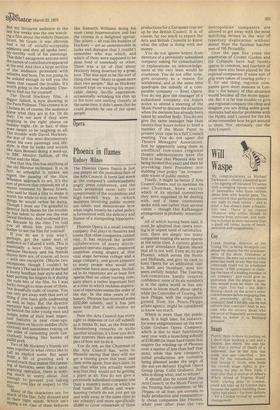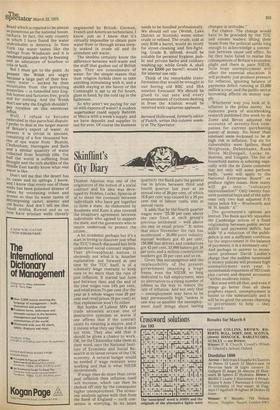Opera
Phoenix in flames
Rodney Manes
The Phoenix Opera fiasco is just one pimple on the pustulous face of the Arts Council. It burst last week at the company's understandably angry press conference, and the facts presented seem only too symptomatic of the mysterious and high-handed way in which decisions involving public money are taken, and demonstrate how what might loosely be called policy is formulated with the delicacy and finesse of a stampeding hippopotamus.
Phoenix Opera is a small touring company that plays in theatres and towns that other companies cannot visit. It has enjoyed the artistic collaboration of many distinguished operatic experts, employed countless young singers at that vital stage between college and a large company, and given pleasure to many people who would not otherwise have seen opera. Included in its repertoire are at least five operas, that no other touring company plays, a rather important fact at a time in which reckless duplication of repertoire seems the order of the day. In the nine years of its history, Phoenix has received some £232,000 subsidy, and it has just been told that it will receive no more.
Now the Arts Council has every right to dispense or cut off subsidy . as it thinks fit, but, as the Princess Werdenberg remarks in quite another situation, it's how you do it that matters. Here are some examples of how not to do it. You do not, as the Chairman of the Arts Council has, write to Phoenix saying that they will not get a touring grant this year, and then write again, four days later, to say that what you actually meant was that they would not be getting a grant at all. You do not give a previously subsidised company less than a month's notice in which to find funds for offices and warehousing (which do not just get up and walk away at the same time as the subsidy) and more specifically £5,000 to cover rehearsals of three productions for a European tour set up by the British Council. It is, of course, far too much to expect the Arts and British Councils to know what the other is doing with our money.
You do not ignore letters from directors of a previously subsidised company asking for consultations or explanations: an acknowledgement at the very least would be courteous. You do not offer stringent economy as a reason for withdrawal, and at the same time quadruple the subsidy of a comparable company — Kent Opera. You do not give the manager of a subsidised company six hours notice to attend a meeting of the Music Panel to discuss the situation when the decision has already been taken by another body. You do not give the same manager less than twenty-four hours notice to brief a member of the Music Panel to present your case to a full Council meeting. You do not upset the Theatre Managers' Association, first by apparently using them as unofficial tom-toms (regional theatre administrators were the first to hear that Phoenix was not being booked this year) and then by provoking their President into dubbing your policy "an irresponsible waste of public money."
Finally, it might be better if Arts Council clients, not to mention its own Chairman, knew exactly which of its myriad committees they were supposed to be dealing with, and if these committees spoke with one rather than several voices — though this Kafkaesque arrangement is probably intentional.
All of which having been said, it must be admitted that opera touring is in urgent need of rationalisation: there are simply too many companies touring the same operas at the same time. A cursory glance at poor attendance figures shows that all is not well. Even so, to axe Phoenix, which serves the North and Midlands, and give its cash to Kent Opera for an additional visit to Bath and Horsham, does not seem awfully helpful. The Touring Sub-committee hardly inspires confidence: none of its six members is in the opera world or has any reason to know much about opera, while the Controller of Touring, Mr Jack Phipps, with the experience gained from his Pears-Phipps artists agency, might be considered to know too much.
Which is more than the public does. It is high time, for instance, for some enlightenment on the new Colin Graham Opera Company, which is due to start functioning next year with a launching subsidy of E150,000 (in these hard times that require the winding up of Phoenix over a matter of less than half that sum), while this new company's initial productions are currently being planned under the aegis of the not-yet-defunct English Opera Group (prop. Colin Graham). Just who is doing what, and to whom? It should also be noted that the Arts Council, or the Music Panel, or the Touring Sub-committee, or Mr Phipps, or all four, are content to bully productive and comparative ly cheap companies like Phoenix, while year after year the two metropolitan companies are allowed to get away with the most stultifying betises in the way of repertory duplication without demur from the faceless hatchet men of 105 Piccadilly.
Over the past five years the repertories of Covent Garden and the Coliseum have had twenty operas in common, and fourteen of these have also been played by the regional companies. If some sort of grip were taken of touring policy — if, for one thing, regional companies gave short seasons in London — the lunacy of this situation would become all the more apparent. But it is far less trouble to give one regional company the chop and imagine you are doing some good. Hercules had similar problems with the Hydra, and I cannot for the life of me remember how he got around to them. Nor, obviously, can the Arts Council. Brazil which is reputed to be almost as poisonous as the national booze, cachaca. In fact, the only country in which I have found the water undrinkable is America. In New York tap water tastes like the tailings from Windscale and it is rendered palatable only by freezing and an admixture of bourbon or cola or both.
But I must get to the point. At present the Welsh are angry because a large part of their heavenly water — sucked by their mountains from the prevailing westerlies — is funnelled into English homes and factories free, gratis and for nothing. And the Welsh don't see why the English shouldn't Pay royalites on this enormous influx.
Well, I refuse to become embroiled in this parochial dispute. I prefer to deal in the larger matter of Britain's export of water. At present it is trivial in amount, consisting of a few thousand bottles of spa water from Buxton, Cheltenham, Harrogate and Bath and a similar quantity of water collected from Scottish rills. Yet half the world is suffering from drought and the rich sheikhs of the Middle East hardly know what real water is like.
Don't tell me that the desert has its oases and its springs. I know, and I know that every one of these walls has been poisoned dozens of times by retreating tribes and armies so that its water tastes of decomposing camel, arsenic and old boots. And don't tell me that Saudi Arabia, Kuwait and so on now have artesian wells cleverly engineered by British, German, French and American technicians. I know, just as I know that it's virtually impossible to obtain pure water from or through strata simply soaked in crude oil and its attendant salt water.
The sheikhs certainly know the difference between well-wafer and the stuff that gushes out of British taps. They are connoisseurs of water, for the simple reason that their religion forbids them to take anything stimulating with it, and a sheikh staying at the Savoy or the Connaught is apt to sit for hours, glass in hand, by the cold tap in the bathroom.
So why aren't we paying for our oil with exports of water? A modern supertanker could supply Bahrein or Mecca with a week's supply, and we have deposits and supplies to last for ever. Of course the business needs to be handled professionally. We should sell our (Welsh, Lake District or Scottish) water either crude or refined. The crude, sold at only $100 a barrel, would do nicely for street-cleaning and fire-fighting. Grade B, refined, would be suitable for personal hygiene, public and private baths and culinary washing-up; while Grade A, shall we say $2000 per barrel?, would be for internal use only.
Think of the remarkable transformation that would be wrought in our boring old BBC and IBA weather forecasts! We should be glued to our sets and every announcement of cyclones dashing in from the Atlantic would be received with rapturous applause ..
Bernard Hollowood, formerly editor of Punch, writes this column weekly in The Spectator.



































 Previous page
Previous page